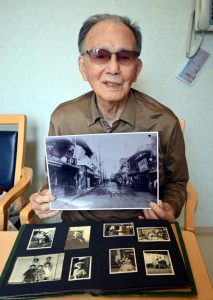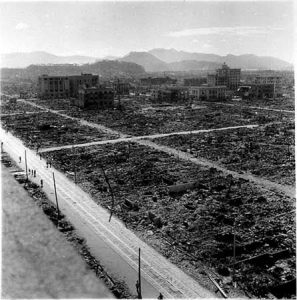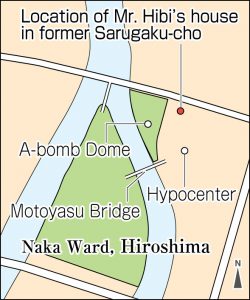Striving to fill voids in Hiroshima—In instant, Yoshio Hibi, resident of former Sarugaku-cho, lost family, neighborhood where he grew up
Oct. 2, 2023
Shares account of A-bomb experiences for first time in hopes reality of that time is passed on
by Kyoko Niiyama, Staff Writer
Yoshio Hibi, 93, a resident of Hatsukaichi City who lived in the former area of Sarugaku-cho (now part of Hiroshima’s Naka Ward), located directly below the hypocenter, lost the basic structure of his family on the day of the atomic bombing 78 years ago, leaving him an orphan and alone. Although he lived his life after that time without speaking of his devastating experiences in the bombing, he began to want to “convey the reality of how my neighborhood, filled as it was with memories, was gone in an instant and how people’s lives were stolen.” Prompting his decision was an August article in the Chugoku Shimbun, in which residents of the former Sarugaku-cho talked about their memories. Mr. Hibi recently spoke to a Chugoku Shimbun staff writer in what he called his “first and last testimony about those events.”
Mr. Hibi was the youngest of five siblings. The former Sarugaku-cho was an area that extended from the east side of the A-bomb Dome to the main Kamiya-cho intersection. His home was located in vicinity of the southeast side of the present-day Orizuru Tower building. His oldest brother managed the Hibi Furniture shop in the place of his father, who had died of illness. However, by 1945, due to shortages of goods during the war, the shop had closed down.
At the time, Mr. Hibi, 15 years old and a third-year student at Matsumoto Technical High School (present-day Setouchi High School), was living with his mother and sister. On August 6, 1945, he had been mobilized to work on the production of munitions at Saeki Kogyo, located in the area of Funairi Saiwai-cho (now part of Hiroshima’s Naka Ward), about 1.5 kilometers from the hypocenter. “Just after our outdoor morning assembly finished, I was exposed to a flash of light and knocked to the ground.” After rescuing someone who had been trapped under a building, he looked over in the direction of his house and saw flames rising upward.
After escaping the flames and as he approached Yokogawa Station (in Hiroshima’s present-day Nishi Ward), a young boy clung to him and asked him to “take me with you.” The boy’s face was disfigured from swelling and he could barely walk. He soon called out, “Mother,” to a woman nearby and walked over to her, but his burns were so severe and his face so disfigured that she failed to recognize him as her own child. “He probably didn’t survive. To this day, when I recall that scene, my heart aches,” said Mr. Hibi.
Although he reached the area of Midorii (now part of Hiroshima’s Asaminami Ward), a designated evacuation site for Sarugaku-cho residents, there was no one who had fled from that part of the city directly below the hypocenter. About one week after the atomic bombing, he returned to his house, located around 100 meters north of the hypocenter. His relatives had already found the bodies of his mother, Tsuneko, 59 at the time, his older sister Yoshiko, 17, and Kazuhiro, his oldest brother’s son, 7. They had apparently died instantly.
The bustling neighborhood was gone, and only ruins remained. During the chaos immediately after the war, he was unable to rely on brothers who had been put up for adoption or close relatives. He stayed in a barn in the town of Fuchu-cho in Hiroshima Prefecture, where extended family lived, and helped with fieldwork to get by. “I also raised hares and sold them.” He later got a job with the Hiroshima Railway Post Office, where he worked hard until his retirement.
He relayed that his experiences in the atomic bombing and his life after the war were filled with pain and suffering that, “Only I know about.” He never shared his experiences with his wife and children. However, when he read the article in the August 3 issue of the Chugoku Shimbun newspaper, in which were described the thoughts and memories of a resident who operated a cosmetics shop in Sarugaku-cho and family members who operated a container shop, he said, “I began to consider what I could do with the time I had left.”
Mr. Hibi and his wife now live at an elderly care facility in Hatsukaichi City. Holding on to distant memories, he implored, “Nothing good comes from possessing nuclear weapons. From my own experience, I want everyone to understand that.”
(Originally published on October 2, 2023)










